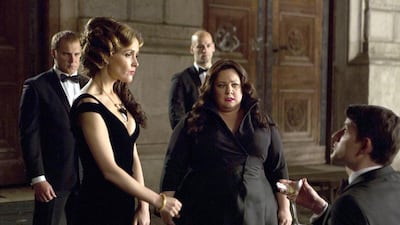Director: Paul Feig
Starring: Melissa McCarthy, Jude Law, Rose Byrne, Jason Statham
Three stars
The movie world has been an infinitely better place ever since Melissa McCarthy called out an air marshal in 2010's Bridesmaids in a celluloid moment that catapulted her to stardom. Spy is the third comedy in a row in which director Paul Feig has employed McCarthy's considerable talents, but it's the first showing signs that the partnership may be wearing thin.
You don't even have to read the credits to realise that this was also the first of those films written by a male – Feig himself. Indeed, what made Bridesmaids and The Heat so unique was that those films gave us a peek into a female perspective – which cinema so often neglects – and consequently they seemed unique and fresh. This spy movie, however, follows the tropes of Austin Powers and The Pink Panther, where we are expected to laugh because here is a spy who doesn't fit the James Bond formula, but in the end it's just the same as every other spy-movie spoof: there are double agents, ludicrous action scenes and a creaky plot.
However, there also is McCarthy. The film shines whenever she’s allowed to do what she does best – situational comedy and smart one-liners. This is particularly true of moments with Jason Statham, who brilliantly sends his own action persona up as an overly intense agent, and those with Miranda Hart, who is Laurel to McCarthy’s Hardy. But whenever the comedic scenes get into a flow, Feig feels the need to give us a thrill, and sends the CIA agents bouncing from America to Paris, Rome and Budapest.
It’s also unfortunate that in setting up the transformation of McCarthy from a desk CIA analyst into emergency spy, too much emphasis is put on her looks. Boringly, her field partner, a Bond-like figure played by Jude Law, cannot see beyond her appearance and the CIA director (Allison Janney) refuses to acknowledge her as an effective outdoor operative. Feig might be making a comment about society’s prejudices, but it’s laboured to the point where it seems to reinforce, rather than belittle, the stereotype.
Feig also can’t quite decide who the villain should be. There’s Rose Byrne, an uptight, garishly dressed Bulgarian who criticises the fashion sense of others, has inherited her father’s evil empire and has a nuclear bomb to sell. Then there is the arms dealer (Bobby Cannavale), who turns up in the final act, way too late to have any emotional resonance with the audience.
Spy offers plenty of laughs along the way, thanks to McCarthy, but it's disappointingly slapdash and déjà vu.
• Spy is out in cinemas now
artslife@thenational.ae


